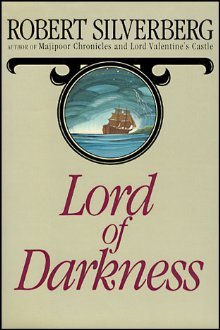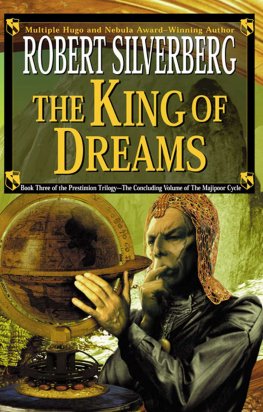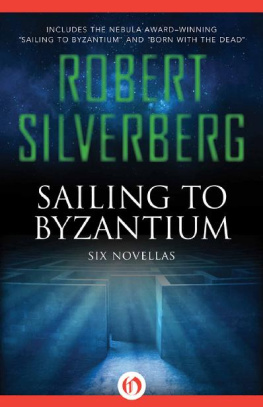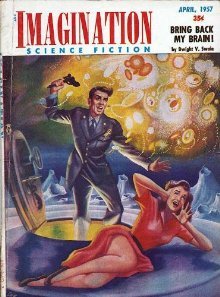Robert Silverberg - The Macauley Circuit
Here you can read online Robert Silverberg - The Macauley Circuit full text of the book (entire story) in english for free. Download pdf and epub, get meaning, cover and reviews about this ebook. year: 1956, publisher: King-Size Publications, Inc., genre: Science fiction. Description of the work, (preface) as well as reviews are available. Best literature library LitArk.com created for fans of good reading and offers a wide selection of genres:
Romance novel
Science fiction
Adventure
Detective
Science
History
Home and family
Prose
Art
Politics
Computer
Non-fiction
Religion
Business
Children
Humor
Choose a favorite category and find really read worthwhile books. Enjoy immersion in the world of imagination, feel the emotions of the characters or learn something new for yourself, make an fascinating discovery.

- Book:The Macauley Circuit
- Author:
- Publisher:King-Size Publications, Inc.
- Genre:
- Year:1956
- Rating:4 / 5
- Favourites:Add to favourites
- Your mark:
- 80
- 1
- 2
- 3
- 4
- 5
The Macauley Circuit: summary, description and annotation
We offer to read an annotation, description, summary or preface (depends on what the author of the book "The Macauley Circuit" wrote himself). If you haven't found the necessary information about the book — write in the comments, we will try to find it.
The Macauley Circuit — read online for free the complete book (whole text) full work
Below is the text of the book, divided by pages. System saving the place of the last page read, allows you to conveniently read the book "The Macauley Circuit" online for free, without having to search again every time where you left off. Put a bookmark, and you can go to the page where you finished reading at any time.
Font size:
Interval:
Bookmark:
The Macauley Circuit
by Robert Silverberg
I dont deny I destroyed Macauleys diagram; I never did deny it, gentlemen. Of course I destroyed it, and for fine, substantial reasons. My big mistake was in not thinking the thing through at the beginning. When Macauley first brought me the circuit, I didnt pay much attention to itcertainly not as much as it deserved. That was a mistake, but I couldnt help myself. I was too busy coddling old Kolfmann to stop and think what the Macauley circuit really meant.
If Kolfmann hadnt shown up just when he did, I would have been able to make a careful study of the circuit and, once I had seen all the implications, I would have put the diagram in the incinerator and Macauley right after it. This is nothing against Macauley, you understand; hes a nice, clever boy, one of the finest minds in our whole research department. Thats his trouble.
He came in one morning while I was outlining my graph for the Beethoven Seventh that we were going to do the following week. I was adding some ultrasonics that would have delighted old Ludwignot that he would have heard them, of course, but he would have felt themand I was very pleased about my interpretation. Unlike some synthesizer-interpreters, I dont believe in changing the score. I figure Beethoven knew what he was doing, and its not my business to patch up his symphony. All I was doing was strengthening it by adding the ultrasonics. They wouldnt change the actual notes any, but thered be that feeling in the air which is the great artistic triumph of synthesizing.
So I was working on my graph. When Macauley came in I was choosing the frequencies for the second movement, which is difficult because the movement is solemn but not too solemn. Just so. He had a sheaf of paper in his hand, and I knew immediately that hed hit on something important, because no one interrupts an interpreter for something trivial.
Ive developed a new circuit, sir, he said. Its based on the imperfect Kennedy Circuit of 2261.
I remembered Kennedya brilliant boy, much like Macauley here. He had worked out a circuit which almost would have made synthesizing a symphony as easy as playing a harmonica. But it hadnt quite workedsomething in the process fouled up the ultrasonics and what came out was hellish to hearand we never found out how to straighten things out. Kennedy disappeared about a year later and was never heard from again. All the young technicians used to tinker with his circuit for diversion, each one hoping hed find the secret. And now Macauley had.
I looked at what he had drawn, and then up at him. Hewas standing there calmly, with a blank expression on his handsome, intelligent face, waiting for me to quiz him.
This circuit controls the interpretative aspects of music, am I right?
Yes, sir. You can set the synthesizer for whatever esthetic you have in mind, and itll follow your instruction. You merely have to establish the esthetic coordinatesthe work of a momentand the synthesizer will handle the rest of the interpretation for you. But thats not exactly the goal of my circuit, sir, he said, gently, as if to hide from me the fact that he was telling me I had missed his point. With minor modifications
He didnt get a chance to tell me, because at that moment Kolfmann came dashing into my studio. I never lock my doors, because for one thing no one would dare come in without good and sufficient reason, and for another my analyst pointed out to me that working behind locked doors has a bad effect on my sensibilities, and reduces the esthetic potentialities of my interpretations. So I always work with my door unlocked and thats how Kolfmann got in. And thats what saved Macauleys life, because if he had gone on to tell me what was on the tip of his tongue I would have regretfully incinerated him and his circuit right then and there.
Kolfmann was a famous name to those who loved music. He was perhaps eighty now, maybe ninety, if he had a good gerontologist, and he had been a great concert pianist many years ago. Those of us who knew something about pre-synthesizer musical history knew his name as we would that of Paganini or Horowitz or any other virtuoso of the past, and regarded him almost with awe.
Only all I saw now was a tall, terribly gaunt old man in ragged clothes who burst through my doors and headed straight for the synthesizer, which covered the whole north wall with its gleaming complicated bulk. He had a club in his hand thicker than his arm, and he was about to bash it down on a million credits worth of cybernetics when Macauley effortlessly walked over and took it away from him. I was still too flabbergasted to do much more than stand behind my desk in shock.
Macauley brought him over to me and I looked at him as if he were Judas.
You old reactionary, I said. Whats the idea? You can get fined a fortune for wrecking a cyberor didnt you know that?
My life is ended anyway, he said in a thick, deep, guttural voice. It ended when your machines took over music.
He took off his battered cap and revealed a full head of white hair. He hadnt shaved in a couple of days, and his face was speckled with stiff-looking white stubble.
My name is Gregor Kolfmann, he said. Im sure you have heard of me.
Kolfmann, the pianist?
He nodded, pleased despite everything. Yes, Kolfmann, the former pianist. You and your machine have taken away my life.
Suddenly all the hate that had been piling up in me since he burst inthe hate any normal man feels for a cyberwreckermelted, and I felt guilty and very humble before this old man. As he continued to speak, I realized that Ias a musical artisthad a responsibility to old Kolfmann. I still think that what I did was the right thing, whatever you say.
Even after synthesizing became the dominant method of presenting music, he said, I continued my concert career for years. There were always some people who would rather see a man play a piano than a technician feed a tape through a machine. But I couldnt compete forever. He sighed. After a while anyone who went to live concerts was called a reactionary, and I stopped getting bookings. I took up teaching for my living. But no one wanted to learn to play the piano. A few have studied with me for antiquarian reasons, but they are not artists, just curiosity-seekers. They have no artistic drive. You and your machine have killed art!
I looked at Macauleys circuit and at Kolfmann, and felt as if everything were dropping on me at once. I put away my graph for the Beethoven, partly because all the excitement would make it impossible for me to get anywhere with it today and partly because it would only make things worse if Kolfmann saw it. Macauley was still standing there, waiting to explain his circuit to me. I knew it was important, but I felt a debt to old Kolfmann, and I decided Id take care of him before I let Macauley do any more talking.
Come back later, I told Macauley. Id like to discuss the implications of your circuit, as soon as Im through talking to Mr. Kolfmann.
Yes, sir, Macauley said, like the obedient puppet a technician turns into when confronted by a superior, and left. I gathered up the papers he had left me and put them neatly at a corner of my desk. I didnt want Kolfmann to see them, either, though I knew they wouldnt mean anything to him except as symbols of the machine he hated.
When Macauley had gone I gestured Kolfmann to a plush pneumochair, into which he settled with the distaste for excess comfort that is characteristic of his generation. I saw my duty plainlyto make things better for the old man.
Wed be glad to have you come to work for us, Mr. Kolfmann, I began, smiling. A man of your great gift
He was up out of that chair in a second, eyes blazing. Work for you? Id sooner see you and your machines dead and crumbling! You, you scientistsyouve killed art, and now youre trying to bribe me!
Font size:
Interval:
Bookmark:
Similar books «The Macauley Circuit»
Look at similar books to The Macauley Circuit. We have selected literature similar in name and meaning in the hope of providing readers with more options to find new, interesting, not yet read works.
Discussion, reviews of the book The Macauley Circuit and just readers' own opinions. Leave your comments, write what you think about the work, its meaning or the main characters. Specify what exactly you liked and what you didn't like, and why you think so.

















